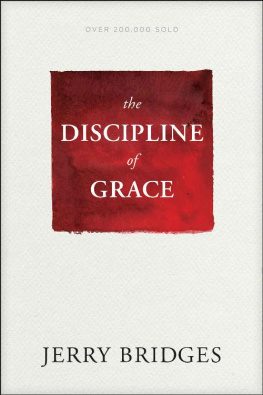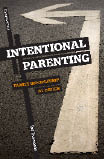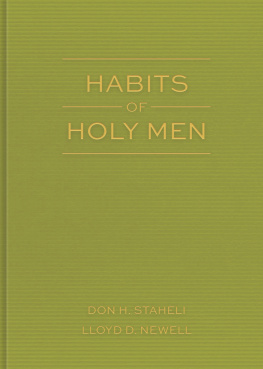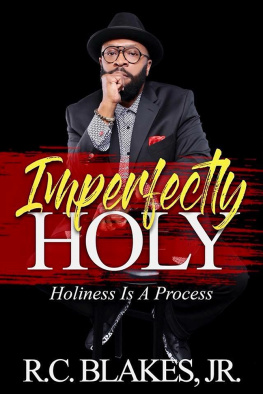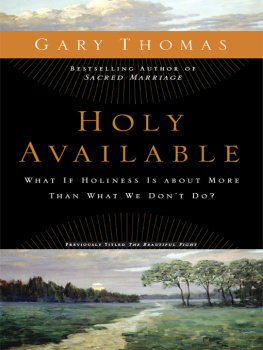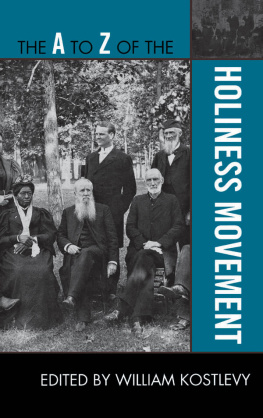Author
Jerry Bridges is a staff member of The Navigators Collegiate Ministries where he is involved in staff training and also serves as a resource person to those ministering on university campuses.
He has been on staff of the Navigators since 1955. From 1979 through 1994, he served as Vice President for Corporate Affairs. In addition to his work in the Collegiate Ministries, he also serves from time to time as a guest lecturer at several seminaries and speaks at numerous conferences and retreats, both in the U.S. and overseas. In 2005, Jerry received an honorary doctorate from Westminster Theological Seminary.
The Pursuit of Holiness, which has sold more than a million copies. Other titles in print are: The Practice of Godliness, Trusting God, Transforming Grace, The Discipline of Grace, The Gospel for Real Life, Is God Really in Control?, The Crisis of Caring, and The Joy of Fearing God. Jerry and his wife, Jane, live in Colorado Springs, Colorado. They have two adult children and five grandchildren.
CHAPTER ONE
Holiness Is for You
For sin shall not be your master, because you are
not under law, but under grace.
ROMANS 6:14
The shrill ring of the telephone shattered the stillness of the beautiful, crisp Colorado morning. On the other end was one of those utterly impossible individuals God seems to have sprinkled around here on earth to test the grace and patience of His children.
He was in top form that morningarrogant, impatient, demanding. I hung up the phone seething inside with anger, resentment, and perhaps even hatred. Grabbing my jacket, I walked out into the cold air to try to regain my composure. The quietness of my soul, so carefully cultivated in my quiet time with God that morning, had been ripped into shreds and replaced with a volatile, steaming emotional volcano.
As my emotions subsided, my anger turned to utter discouragement. It was only 8:30 in the morning and my day was ruined. Not only was I discouraged, I was confused. Only two hours before, I had read Pauls emphatic declaration, For sin shall not be your master, because you are not under law, but under grace. But despite this nice-sounding promise of victory over sin, there I was locked in the vise-like grip of anger and resentment.
Does the Bible really have any answers for real life? I asked myself that morning. With all my heart I desired to live an obedient, holy life; yet there I was utterly defeated by one phone call.
Perhaps this incident has a familiar ring to you. The circumstances probably differed, but your reaction was similar. Perhaps your problem was anger with your children, or a temper at work, or an immoral habit you cant overcome, or maybe several besetting sins that dog you day in and day out.
Whatever your particular sin problem (or problems), the Bible does have the answer for you. There is hope. You and I can walk in obedience to Gods Word and live a life of holiness. In fact, as we will see in the next chapter, God expects every Christian to live a holy life. But holiness is not only expected; it is the promised birthright of every Christian. Pauls statement is true. Sin shall not be our master.
The concept of holiness may seem a bit archaic to our current generation. To some minds the very word holiness brings images of bunned hair, long skirts, and black stockings. To others the idea is associated with a repugnant holier than thou attitude. Yet holiness is very much a scriptural idea. The word holy in various forms occurs more than 600 times in the Bible. One entire book, Leviticus, is devoted to the subject, and the idea of holiness is woven elsewhere throughout the fabric of Scripture. More important, God specifically commands us to be holy (see Leviticus 11:44).
The idea of exactly how to be holy has suffered from many false concepts. In some circles, holiness is equated with a series of specific prohibitionsusually in such areas as smoking, drinking, and dancing. The list of prohibitions varies depending on the group. When we follow this approach to holiness, we are in danger of becoming like the Pharisees with their endless lists of trivial dos and donts, and their self-righteous attitude. For others, holiness means a particular style of dress and mannerisms. And for still others, it means unattainable perfection, an idea that fosters either delusion or discouragement about ones sin.
All of these ideas, while accurate to some degree, miss the true concept. To be holy is to be morally blameless.
Perhaps the best way of understanding the concept of holiness is to note how writers of the New Testament used the word. In 1 Thessalonians 4:3-7, Paul used the term in contrast to a life of immorality and impurity. Peter used it in contrast to living according to the evil desires we had when we lived outside of Christ (1 Peter 1:14-16). John contrasted one who is holy with those who do wrong and are vile (Revelation 22:11). To live a holy life, then, is to live a life in conformity to the moral precepts of the Bible and in contrast to the sinful ways of the world. It is to live a life characterized by the [putting] off of your old self, which is being corrupted by its deceitful desires and [putting] on the new self, created to be like God in true righteousness and holiness (Ephesians 4:22,24).
If holiness, then, is so basic to the Christian life, why do we not experience it more in daily living? Why do so many Christians feel constantly defeated in their struggle with sin? Why does the Church of Jesus Christ so often seem to be more conformed to the world around it than to God?
At the risk of oversimplification, the answers to these questions can be grouped into three basic problem areas.
Our first problem is that our attitude toward sin is more self-centered than God-centered. We are more concerned about our own victory over sin than we are about the fact that our sins grieve the heart of God. We cannot tolerate failure in our struggle with sin chiefly because we are success-oriented, not because we know it is offensive to God.
W. S. Plumer said, We never see sin aright until we see it as against God. All sin is against God in this sense: that it is His law that is broken, His authority that is despised, His government that is set at naught. Pharaoh and Balaam, Saul and Judas each said, I have sinned; but the returning prodigal said, I have sinned against heaven and before thee; and David said, Against Thee, Thee only have I sinned.
God wants us to walk in obediencenot victory. Obedience is oriented toward God; victory is oriented toward self. This may seem to be merely splitting hairs over semantics, but there is a subtle, self-centered attitude at the root of many of our difficulties with sin. Until we face this attitude and deal with it, we will not consistently walk in holiness.
This is not to say God doesnt want us to experience victory, but rather to emphasize that victory is a byproduct of obedience. As we concentrate on living an obedient, holy life, we will certainly experience the joy of victory over sin.
Our second problem is that we have misunderstood living by faith (Galatians 2:20) to mean that no effort at holiness is required on our part. In fact, sometimes we have even suggested that any effort on our part is of the flesh.
The words of J. C. Ryle, Bishop of Liverpool from 1880 to 1900, are instructive to us on this point: Is it wise to proclaim in so bald, naked, and unqualified a way as many do, that the holiness of converted people is by faith only, and not at all by personal exertion? Is it according to the proportion of Gods Word? I doubt it. That faith in Christ is the root of all holiness no well-instructed Christian will ever think of denying. But surely the Scriptures teach us that in following holiness the true Christian needs personal exertion and work as well as faith.


